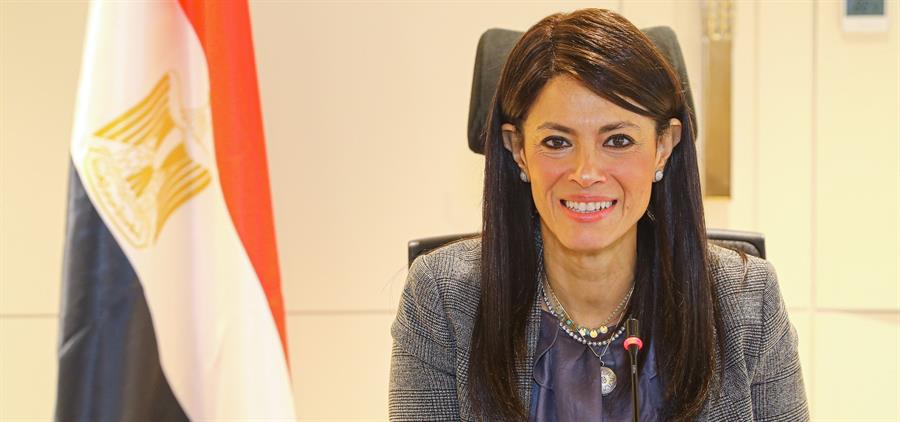With the participation of officials from the World Bank Group, International Monetary Fund, African Development Bank, government representatives, and private sector members Ministry of Planning, Economic Development, and International Cooperation participates in the 2024 African Caucus Meeting in Nigeria to discuss facilitating trade between African countries to stimulate sustainable economic growth

03 August 2024
Minister of Planning, Economic Development, and International Cooperation and Egypt's Governor at the World Bank: We are working to enhance the financial space available to African countries from international institutions to implement the 2063 development agenda
H.E. Minister Al-Mashat: The ongoing meetings in Nigeria strengthen the continuous cooperation between the World Bank and stakeholders on the continent to activate the Continental Free Trade Area Agreement
Egypt seeks integration with continental countries within the framework of Egypt Vision 2030 and encourages South-South cooperation to drive trade and investment
The meetings address shared payment systems, digital transformation, and sustainable infrastructure to activate the African Free Trade Agreement
The World Bank and African Development Bank discuss implementing an initiative to provide 300 million African citizens with electricity by 2030
The Ministry of
Planning, Economic Development, and International Cooperation participated in
the 2024 African Caucus Meeting, held in Abuja, Nigeria, from August 1-3, 2024.
This meeting, hosted by the Governors of the International Monetary Fund and
the World Bank Group, was titled "Facilitating Intra-African Trade:
Catalyst for Sustainable Economic Growth in Africa" and was under the
patronage of Nigerian President Bola Tinubu. It was attended by delegations and
ministers from various African countries as well as representatives from
international financial institutions.
H.E. Dr. Rania A.
Al-Mashat, Minister of Planning, Economic Development, and International
Cooperation and Egypt’s Governor at the World Bank Group, commented on the
meetings, highlighting their significance within the ongoing discussions
between the African Group and the World Bank Group. H.E. Minister Al-Mashat
emphasized the importance of enhancing cooperation with one of the largest
multilateral development banks to overcome developmental challenges facing the
continent and to advance the Africa 2063 development agenda.
H.E. Dr. Al-Mashat
underscored the crucial role of multilateral development banks in fostering
economic growth by encouraging private sector investments, providing
concessional financing, and promoting partnerships for capacity building,
knowledge exchange, and technology transfer.
In this context,
H.E. Minister Al-Mashat also noted the alignment between Egypt Vision 2030 for
sustainable development and Africa 2063, emphasizing the importance of
coordination with the World Bank to achieve regional integration and leverage
South-South cooperation mechanisms to benefit from developmental experience
exchanges. H.E. Dr. Al-Mashat added that the ongoing meetings in Nigeria are
enhancing the continuous cooperation between the World Bank and continental
stakeholders to implement the Continental Free Trade Area Agreement.
During the
meetings, World Bank officials presented the group’s strategy on regional
integration in Africa. They also discussed the initiative launched in April
between the World Bank Group and the African Development Bank to provide
electricity to approximately 300 million people in Africa by 2030 through
distributed renewable energy systems or distribution networks. This initiative
is crucial for enhancing services for the continent’s citizens and supporting
economic growth through partnerships between multilateral development banks and
private sector investments.
The meetings also
explored ways to activate the Continental Free Trade Area Agreement by
standardizing payment systems across the continent, enhancing digital
transformation efforts, developing sustainable infrastructure, and implementing
effective policies to promote digitization. Additionally, the discussions
covered topics such as facilitating access to finance for startups and digital
technology from the private sector, guarantees as a source of finance in
Africa, and improving trade and regional integration. The meetings also
addressed infrastructure development, energy provision, and connectivity
services to create a conducive economic environment for growth, the impact of
digital transformation on developmental change, and the benefits of partnerships
with multilateral development banks. The discussions also included the 21st
replenishment of the International Development Association (IDA) resources of
the World Bank.
It is noteworthy
that there are numerous areas of cooperation and mechanisms between the World
Bank Group and African countries, particularly through affiliated institutions
such as the International Finance Corporation and the Multilateral Investment
Guarantee Agency (MIGA), which provides investment guarantees to stimulate the
private sector. In this context, the World Bank has issued several diagnostic
reports on various development areas in Africa, including the Digital Africa
report, the Land Policies for Resilience and Inclusive Growth report,
structural reforms to encourage the private sector, and others.









